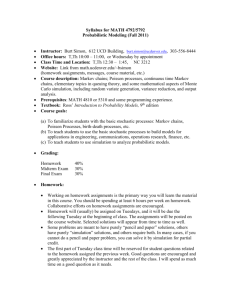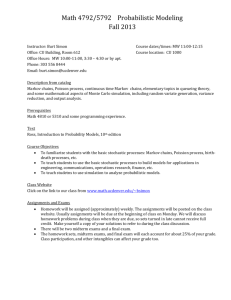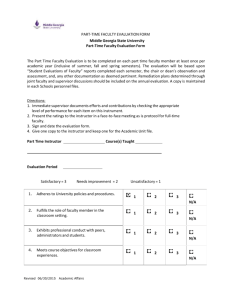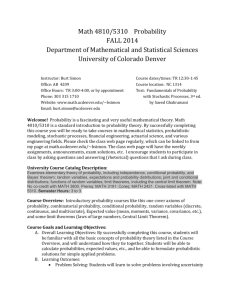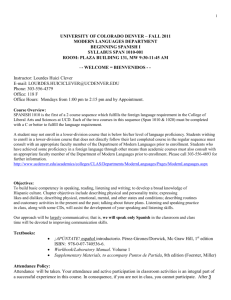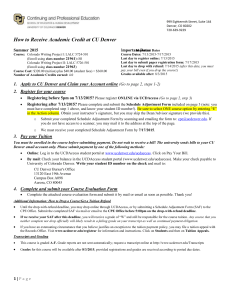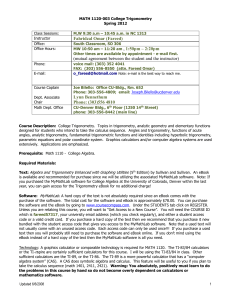Course Syllabus - Mathematical & Statistical Sciences
advertisement
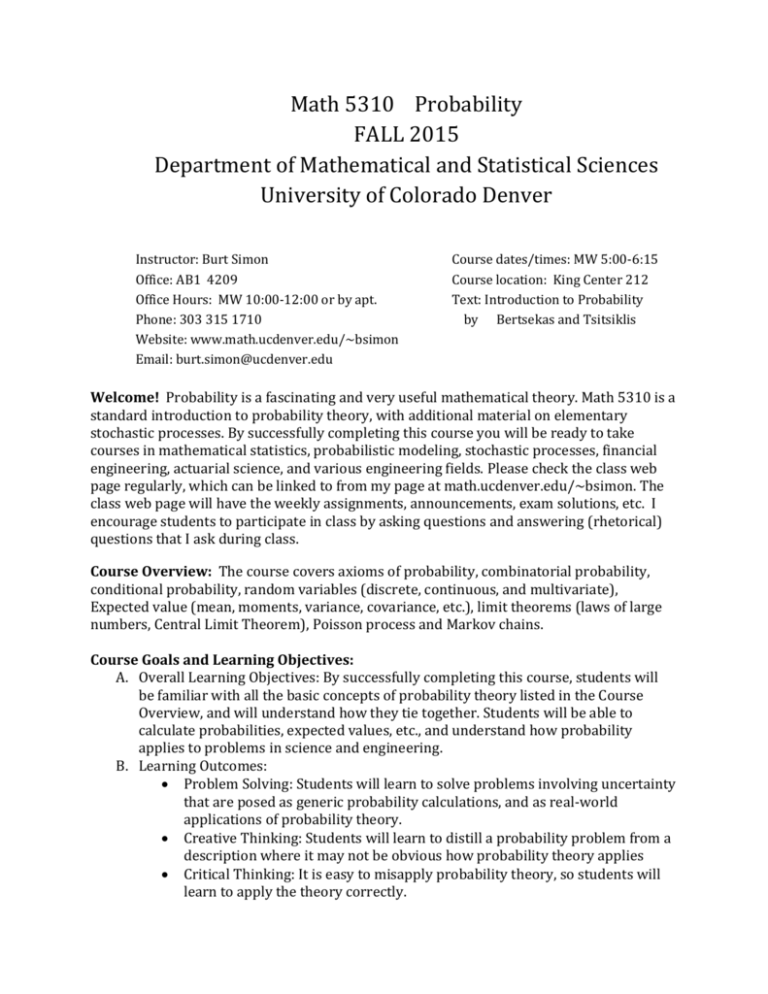
Math 5310 Probability FALL 2015 Department of Mathematical and Statistical Sciences University of Colorado Denver Instructor: Burt Simon Office: AB1 4209 Office Hours: MW 10:00-12:00 or by apt. Phone: 303 315 1710 Website: www.math.ucdenver.edu/~bsimon Email: burt.simon@ucdenver.edu Course dates/times: MW 5:00-6:15 Course location: King Center 212 Text: Introduction to Probability by Bertsekas and Tsitsiklis Welcome! Probability is a fascinating and very useful mathematical theory. Math 5310 is a standard introduction to probability theory, with additional material on elementary stochastic processes. By successfully completing this course you will be ready to take courses in mathematical statistics, probabilistic modeling, stochastic processes, financial engineering, actuarial science, and various engineering fields. Please check the class web page regularly, which can be linked to from my page at math.ucdenver.edu/~bsimon. The class web page will have the weekly assignments, announcements, exam solutions, etc. I encourage students to participate in class by asking questions and answering (rhetorical) questions that I ask during class. Course Overview: The course covers axioms of probability, combinatorial probability, conditional probability, random variables (discrete, continuous, and multivariate), Expected value (mean, moments, variance, covariance, etc.), limit theorems (laws of large numbers, Central Limit Theorem), Poisson process and Markov chains. Course Goals and Learning Objectives: A. Overall Learning Objectives: By successfully completing this course, students will be familiar with all the basic concepts of probability theory listed in the Course Overview, and will understand how they tie together. Students will be able to calculate probabilities, expected values, etc., and understand how probability applies to problems in science and engineering. B. Learning Outcomes: Problem Solving: Students will learn to solve problems involving uncertainty that are posed as generic probability calculations, and as real-world applications of probability theory. Creative Thinking: Students will learn to distill a probability problem from a description where it may not be obvious how probability theory applies Critical Thinking: It is easy to misapply probability theory, so students will learn to apply the theory correctly. C. Major Topics: axioms of probability, combinatorial probability, conditional probability, random variables (discrete, continuous, and multivariate), Expected value (mean, moments, variance, covariance, etc.), limit theorems (laws of large numbers, Central Limit Theorem), Poisson process, Markov chains. D. Rationale: Probability is required as a prerequisite for many upper division math courses, like statistics, probabilistic modeling, stochastic processes; and is useful in business, engineering, and other technical fields. Course Prerequisites: Math 2421 (calc. II) Course Credits: 3 credit hours Required Texts and Materials: Introduction to Probability 2nd ed., Bertsekas and Tsitsiklis Assignments: I will assign homework problems (approximately) weekly. Typically the assignment will be posted on the class web page on Monday, and will be due the following Monday. The purpose of the homework each week is to practice the material covered in class that week. Working collectively on the homework assignments is encouraged! Homework sets will be discussed in class the day they are due. There will (often) be a quiz based on the homework problems after the discussion. Basis for Final Grade: Your final grade will be based on your quiz scores, midterm exam score, and final exam score (approximately 1/3 each). Intangibles, such as class participation, can increase your grade. Grade Dissemination: I will try to grade quizzes and exams before the next class. If you sense a mistake in my grading, please send me an email, or come to my office hours to discuss. Course Policies A. Attendance: I will not take attendance, but students are expected to attend every class. You will be responsible for material I cover in class, whether or not it is in the textbook. Class participation is one of the important “intangibles” that can impact your grade. B. Try to give me as much lead time as possible if you know something will force you to miss a quiz or midterm. There is no way to reschedule the final exam. C. Extra Credit Policy: There is no “extra credit” in general, but students can try to raise their grades by being attentive (and participating constructively) in class, and demonstrating competence in my office hours. D. Grades of “Incomplete”: I must follow university procedures on “incompletes”, i.e., they are only given in situations where unexpected emergencies prevent students from completing the course and the remaining work can be easily finished the following semester. Incomplete work must be finished the next semester or the grade automatically turns into an F. E. Group Work Policy: Students are encouraged to collaborate on homework sets. Of course, no collaboration is allowed on quizzes and exams, as that is considered cheating. F. Announcements: I will use the class web page for all communication that is meant for the whole class. Please check the page regularly. Private communication is best done by email. I will typically respond within a day. G. Laptops, Cell Phones, etc.: You are free to use your devices as you see fit during class. (No phone calls or texting, of course.) The rules during exams will be announced prior to the tests. Usually my exams are open-book, open-notes, and electronic devices (calculators, computers, etc.) are allowed for certain things. H. Civility: Students are expected to be quiet and attentive during class, although raising your hand to ask a question or make a comment is welcome and encouraged. Dishonesty: Students are expected to understand intuitively what proper ethical conduct means in the context of a college mathematics course. If you are caught cheating you could fail the class or (at least) have your grade lowered, so don’t even try it. Tentative Course Schedule Class dates Material Covered Description August 17, 19 Sections 1.1 – 1.3 Foundations August 24, 26 Sections 1.4 = 1.6 Foundations, Combinatorics Aug 31, Sept 2 Sections 2.1 – 2.3 Discrete rv’s September 9 Sections 2.4 – 2.7 Discrete rv’s September 14, 16 Sections 3.1 – 3.2 General rv’s September 21, 23 Sections 3.3 – 3.4 Joint rv’s September 28, 30 Sections 3.5 – 3.6 Conditioning October 5, 7 Sections 4.1 – 4.3 Covariance October 12, 14 Sections 4.4 = 4.5 Sums of rv’s October 19, 21 Review and Midterm Exam Exam on 21st October 26, 28 Sections 5.1 – 5.5 Limit theorems November 2, 4 Sections 6.1 – 6.2 Poisson process November 9, 11 Sections 7.1 – 7.3 Markov chains November 16, 18 Sections 7.4 – 7.5 Markov chains November 23-27 Thanksgiving break Nov 30, Dec 2 December 7 or 9 Catch up and Review Final Exam (date of exam to be announced) Fall 2015 CLAS Academic Policies The following policies, procedures and deadlines pertain to all students taking classes in the College of Liberal Arts and Sciences (CLAS). They are aligned with the Official University Academic Calendar: http://www.ucdenver.edu/student-services/resources/registrar/Documents/AcademicCalendars/downtown/Fall/AcademicCalendarFall2015.pdf Schedule verification: It is each student’s responsibility to verify that their official registration and schedule of classes is correct in their CU Denver PassportID portal before classes begin and by the university census date. Failure to verify schedule accuracy is not sufficient reason to justify late adds or drops. Access to a course through Canvas is not evidence of official enrollment. E-mail: Students must activate and regularly check their official CU Denver e-mail account for university related messages. Administrative Drops: Students may be administratively dropped from a class if they never attended or stopped attending, if the course syllabus indicates that the instructor will do this. Students may be administratively dropped if they do not meet the requisites for the course as detailed in course descriptions. Late adds and late withdrawals require a written petition, verifiable documentation and dean’s approval. CLAS undergraduate students should visit the CLAS advising office (NC1030) and graduate students should visit the Graduate School (12 th floor LSC) to learn more about the petition process and what they need to do to qualify for dean’s approval. Waitlists: The Office of the Registrar notifies students at their CU e-mail account if they are added to a class from a waitlist. Students are not automatically dropped from a class if they never attended, stopped attending, or do not make tuition payments. After waitlists are purged, students must follow late add procedures to be enrolled in a course. Students will have access to Canvas when they are on a waitlist, but this does not mean that a student is enrolled or guaranteed a seat in the course. Students must obtain instructor permission to override a waitlist and this is only possible when there is physical space available in a classroom, according to fire code. Important Dates and Deadlines All dates and deadlines are in Mountain Standard Time (MST). August 17, 2015: First day of classes. August 23, 2015: Last day to add or waitlist a class using the CU Denver PassportID portal. August 24, 2015: Last day to drop a class without a $100 drop charge--this includes section changes. August 24, 2015: All waitlists will be eliminated today. Please check your schedule in your CU Denver PassportID portal to confirm in which classes you are officially enrolled. August 25-September 2, 2015, 5 PM: Students must obtain instructor permission to add a course using the Instructor Permission to Enroll Form and bring it to the CLAS Dean’s Office (NC 5014) or have their instructor e-mail it to CLAS.Courses@ucdenver.edu. September 2, 2015: Census date. o 9/2/15, 5 PM: Last day to add full term classes with instructor approval. Adding a class after this date (late add) requires a written petition, verifiable documentation and dean’s approval. After this date, you will be charged the full tuition amount for additional classes added – College Opportunity Fund hours will not be deducted from eligible student’s lifetime hours. o 9/2/15, 5 PM: Last day to drop full term classes with a financial adjustment. After this date withdrawing from classes require instructor signature approval and will appear on your transcript with a grade of ‘W’. After this date, a complete withdrawal (dropping all classes) from the term will require the signature of the dean and no tuition adjustment will be made. Signature of Financial Aid Office is required if you have accepted financial aid (loans, grants or scholarships). o 9/2/15, 5 PM: Last day to apply for Fall 2015 graduation. Undergraduates must make an appointment and see their academic advisor before this date to apply. Graduate students must complete the Intent to Graduate and Candidate for Degree forms. o 9/2/15, 5 PM: Last day to request No Credit or Pass/Fail grade for a class using a schedule adjustment form. o 9/2/15, 5 PM: Last day to petition for a reduction in Ph.D. dissertation hours. September 3-October 26, 2015, 5 PM: Students must obtain instructor permission to withdraw from a course using the Schedule Adjustment Form and must bring the signed form to the Office of the Registrar. To add a course, students must petition through undergraduate advising or the Graduate School as appropriate. September 7, 2015: Labor Day observed--no classes, campus closed. October 27, 2015: The Office of the Registrar now requires both the instructor’s signature and a dean’s signature on a Schedule Adjustment Form to withdraw from a class. Students should consult their home college advising office for details. November 9, 2015, 5 PM: Deadline for undergraduate CLAS students to withdraw from a course without filing a petition. Contact CLAS Advising. November 23-29, 2015: Fall Break—no classes, campus open. November 26, 2015: Thanksgiving Holiday observed—no classes, campus closed. December 12, 2015: End of semester. December 21, 2015: Final grades available on CU Denver PassportID portal and on transcripts (tentative) Please contact an academic advisor if you have questions or concerns.

